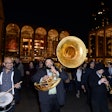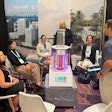
The University of Central Florida's Rosen School of Hospitality Management is an institution that is constantly supplying the industry with qualified students. The faculty works with industry partners to get their input on the ever-changing field, so that the curriculum offered can be tailored to the current state of the market. In the past several years, the university's event management program, along with many other institutions, has adopted courses in hospitality and event risk management, as well as event technology, to keep students up to date on issues.
By building relationships with local universities in your area, you can recruit some of the most passionate and knowledgeable volunteers and interns. As an added bonus, these students are driven and keen on building their résumés with professional work experience, thereby giving providing you with an eager employee who's ready to work.
Cost-efficient recruitment. Partnering with universities opens you up to a pool of potential full-time employees without any recruitments costs. These students understand the event industry and are well versed on pertinent vocabulary, which cuts on training time, thus saving money.
According to Tom Barr, coordinator of experiential learning at Rosen, job fairs are another great way companies can save money on recruiting. As many as 75 companies, ranging from hotels and D.M.C.s to corporations seeking an in-house planner, participate in the school's biannual fair every year.Students are also a great resource for nonprofits that don't have the budget for additional event staffing. Visit Jacksonville, a North Florida C.V.B., has recruited interns from the University of Florida, University of Jacksonville, and the University of North Florida to assist in both planning and event-day staffing.
"As the number of stakeholders in our events grew, we realized we needed extra help", says Lyndsay Rossman, director of corporate communications for Visit Jacksonville, who posted requests through the universities' career development offices. "Plus, it gives these students an opportunity to put their knowledge to work."
Benefits for venues. Venues are a hot commodity among students. For those interested in a career in areas such as group sales, marketing, or facility management, work experience at a venue can add oomph to a student's résumé.
"We use interns and volunteers to assist in marketing projects mostly involving special events," says Gina Stiles, marketing and membership manager for the Jacksonville Zoo and Gardens. "They are responsible for every aspect, from planning to implementation."
A great way for many venues to compensate interns or volunteers is by giving them complimentary access to the property at their leisure-a great incentive for them at no cost to you, as any guests they bring will generate income.
Finding the right candidates. Universities throughout Florida differ in the programs they offer thus providing students with a variety of niche specialties to study. No matter what type of staffing your event requires, it's important to find the right student for the project. For example, if you're a caterer looking for food-savvy caterwaiters, contacting a local culinary school like Le Cordon Bleu-with campuses in Orlando and Miami-is your best bet. On the other hand, a D.M.C. looking for help during season should recruit students from a travel and tourism program like the one at North Miami's Johnson and Wales University. Taking the time to find students specializing in the position you need them to fill will reduce the amount of briefing needed before the event and allow you focus on more pressing pre-event matters.
When it works. While there are many instances when students have proven to be a good addition to an event team, one of the most visible cases is the South Beach Wine & Food Festival.
"This event would not exist without the students", says Lee Brian Schrager, founder of the festival. What started as a Florida International University campus event in 2001, the renowned festival has grown immensely.
"I have been able to see the festival from so many different angles, " says Kimberley Mullings, who began working with the festival since 2003 and now holds a full-time position as operations manager.
More than 700 student associates-previously recognized as volunteers-from the university's School of Hospitality and Tourism Management worked on the 2008 event, with duties ranging from greeting arriving talent and managing infrastructure to assisting in the preparation and execution of food demonstrations.
When it comes to compensation for the lengthy hours these associates put into planning and executing one of the largest culinary festivals in the country, Schrager notes that it goes beyond free food and networking.
"In the past, we have compensated them with scholarships and other incentives. However, this year we decided to pay our students hourly, always reminding them how important they are to the operation," says Schrager.
Investing time in students is also a great hiring technique. At many companies, dedicated interns who've been successful during their time there, and in the classroom, can go on to hold many key positions within the organization.
"Working as an intern for the festival provided me with invaluable hands-on experience, which opened the door for me to work my way up to director of marketing," says Patrick Jong, a Florida International University graduate with a master's in science in tourism studies.
Jong further emphasizes how the internship allowed him to apply what he learned in the classroom to real-life situations under the direction of someone he considers to be one of the most talented event planners in the industry, Schrager. In fact, according to Schrager, 80 percent of the festival staff are FIU graduates who began as interns or student associates and now hold permanent positions with the company.
By building relationships with local universities in your area, you can recruit some of the most passionate and knowledgeable volunteers and interns. As an added bonus, these students are driven and keen on building their résumés with professional work experience, thereby giving providing you with an eager employee who's ready to work.
Cost-efficient recruitment. Partnering with universities opens you up to a pool of potential full-time employees without any recruitments costs. These students understand the event industry and are well versed on pertinent vocabulary, which cuts on training time, thus saving money.
According to Tom Barr, coordinator of experiential learning at Rosen, job fairs are another great way companies can save money on recruiting. As many as 75 companies, ranging from hotels and D.M.C.s to corporations seeking an in-house planner, participate in the school's biannual fair every year.Students are also a great resource for nonprofits that don't have the budget for additional event staffing. Visit Jacksonville, a North Florida C.V.B., has recruited interns from the University of Florida, University of Jacksonville, and the University of North Florida to assist in both planning and event-day staffing.
"As the number of stakeholders in our events grew, we realized we needed extra help", says Lyndsay Rossman, director of corporate communications for Visit Jacksonville, who posted requests through the universities' career development offices. "Plus, it gives these students an opportunity to put their knowledge to work."
Benefits for venues. Venues are a hot commodity among students. For those interested in a career in areas such as group sales, marketing, or facility management, work experience at a venue can add oomph to a student's résumé.
"We use interns and volunteers to assist in marketing projects mostly involving special events," says Gina Stiles, marketing and membership manager for the Jacksonville Zoo and Gardens. "They are responsible for every aspect, from planning to implementation."
A great way for many venues to compensate interns or volunteers is by giving them complimentary access to the property at their leisure-a great incentive for them at no cost to you, as any guests they bring will generate income.
Finding the right candidates. Universities throughout Florida differ in the programs they offer thus providing students with a variety of niche specialties to study. No matter what type of staffing your event requires, it's important to find the right student for the project. For example, if you're a caterer looking for food-savvy caterwaiters, contacting a local culinary school like Le Cordon Bleu-with campuses in Orlando and Miami-is your best bet. On the other hand, a D.M.C. looking for help during season should recruit students from a travel and tourism program like the one at North Miami's Johnson and Wales University. Taking the time to find students specializing in the position you need them to fill will reduce the amount of briefing needed before the event and allow you focus on more pressing pre-event matters.
When it works. While there are many instances when students have proven to be a good addition to an event team, one of the most visible cases is the South Beach Wine & Food Festival.
"This event would not exist without the students", says Lee Brian Schrager, founder of the festival. What started as a Florida International University campus event in 2001, the renowned festival has grown immensely.
"I have been able to see the festival from so many different angles, " says Kimberley Mullings, who began working with the festival since 2003 and now holds a full-time position as operations manager.
More than 700 student associates-previously recognized as volunteers-from the university's School of Hospitality and Tourism Management worked on the 2008 event, with duties ranging from greeting arriving talent and managing infrastructure to assisting in the preparation and execution of food demonstrations.
When it comes to compensation for the lengthy hours these associates put into planning and executing one of the largest culinary festivals in the country, Schrager notes that it goes beyond free food and networking.
"In the past, we have compensated them with scholarships and other incentives. However, this year we decided to pay our students hourly, always reminding them how important they are to the operation," says Schrager.
Investing time in students is also a great hiring technique. At many companies, dedicated interns who've been successful during their time there, and in the classroom, can go on to hold many key positions within the organization.
"Working as an intern for the festival provided me with invaluable hands-on experience, which opened the door for me to work my way up to director of marketing," says Patrick Jong, a Florida International University graduate with a master's in science in tourism studies.
Jong further emphasizes how the internship allowed him to apply what he learned in the classroom to real-life situations under the direction of someone he considers to be one of the most talented event planners in the industry, Schrager. In fact, according to Schrager, 80 percent of the festival staff are FIU graduates who began as interns or student associates and now hold permanent positions with the company.



















